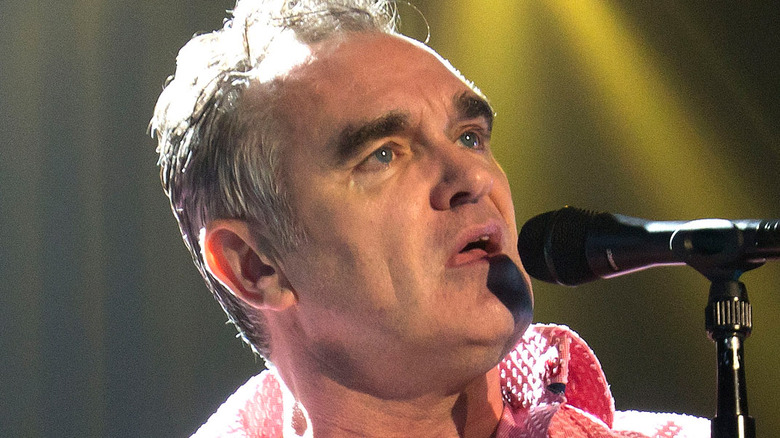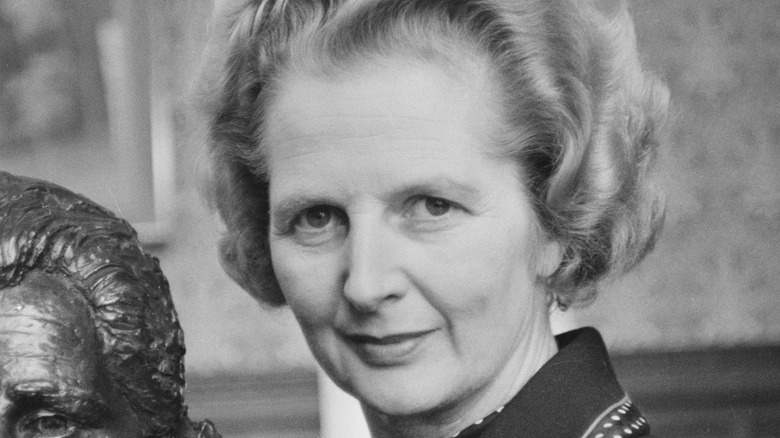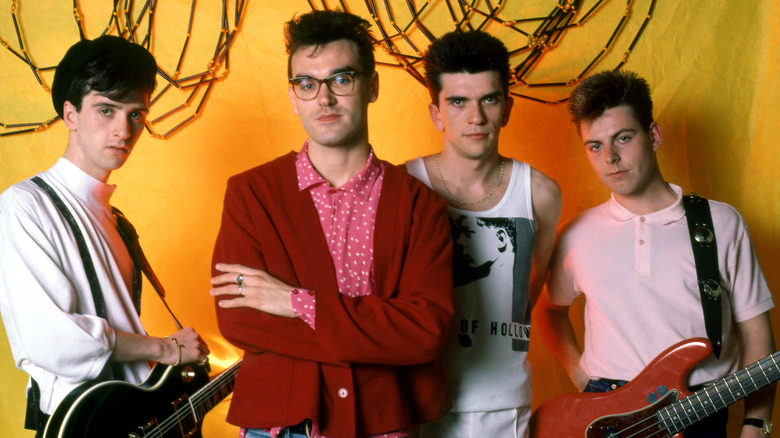How The Smiths Really Got Their Name
Formed around the core songwriting partnership of singer Morrissey (born Steven Patrick Morrissey), and guitarist Johnny Marr (born John Maher), The Smiths are one of the most beloved and highly regarded rock groups of the 1980s, though their career never lasted beyond the decade (via AllMusic). Formed in 1982, by 1987 The Smiths were no more, but in the intervening five years the band released a series of influential records and singles compilations that continue to influence English rock music to this day.
Unlike The Jackson 5 or the Carter Family, though — each with members who had the surname Jackson and Carter — no one in this English quartet, rounded out by Mike Joyce on drums and Andy Rourke on bass guitar, actually had the last name Smith. Nor did any band member adopt Smith as a stage name, similar to how members of the punk rock group the Ramones adopted the last name Ramone (per Britannica). With all that in mind, where did The Smiths band name really come from?
The Smiths broke through in Thatcherite England
To help understand how and why The Smiths resonated in Britain such as they did it's important to note that the ground came up in Thatcherite England, amidst a series of conservative reforms in the country lead by British Prime Minister Margaret Thatcher. Her administration aimed to right the economic calamity that Britain faced throughout the 1970s with mixed results, based on reporting from the BBC. In their lyrics, aesthetic, and sound, The Smiths — formed in working class, post-industrial Manchester — positioned themselves as opposing Thatcher's conservative agenda.
Though never expressly political, The Smiths — with Morrissey as their mouthpiece — sided with the common individual on several occasions, such as in 1986 when they performed in the left-leaning Labour Party-affiliated Red Wedge tour, according to Pitchfork. Singer Morrissey also expressed his disdain for Thatcher's administration in several interviews, such as in 1984 when he said (via Pitchfork) "The entire history of Margaret Thatcher is one of violence and oppression and horror ... I think that we must not lie back and cry about it. She's only one person, and she can be destroyed."
The Smiths were also a reaction to new wave
The reason why The Smiths resonated the way that they did in their era, and where their name really came from, also relates to the other new wave English groups from that time like Duran Duran and Orchestral Maneuvers in the Dark, among others (via Forbes). With their austere and cutting yet witty lyrics, and classic pop guitar rock-style songwriting, The Smiths were an alternative to the synth-heavy, dance-oriented pop music that those bands played. So, too, was their generally more understated aesthetic full of denim and secondhand shop-style clothing, especially when compared to those other bands who were often known to wear makeup and extravagant outfits on stage.
For these reasons, The Smiths — name included, referring to both the common British surname as well as the industrial trade of "smithing" — came about not so much as a name, but to represent the common people of Britain, and in the English north in particular. As Morrissey said for himself in an interview (via Harry Limes' book "The Smiths") "[The Smiths] was the most ordinary name and I thought it was time that the ordinary folk of the world showed their faces."


